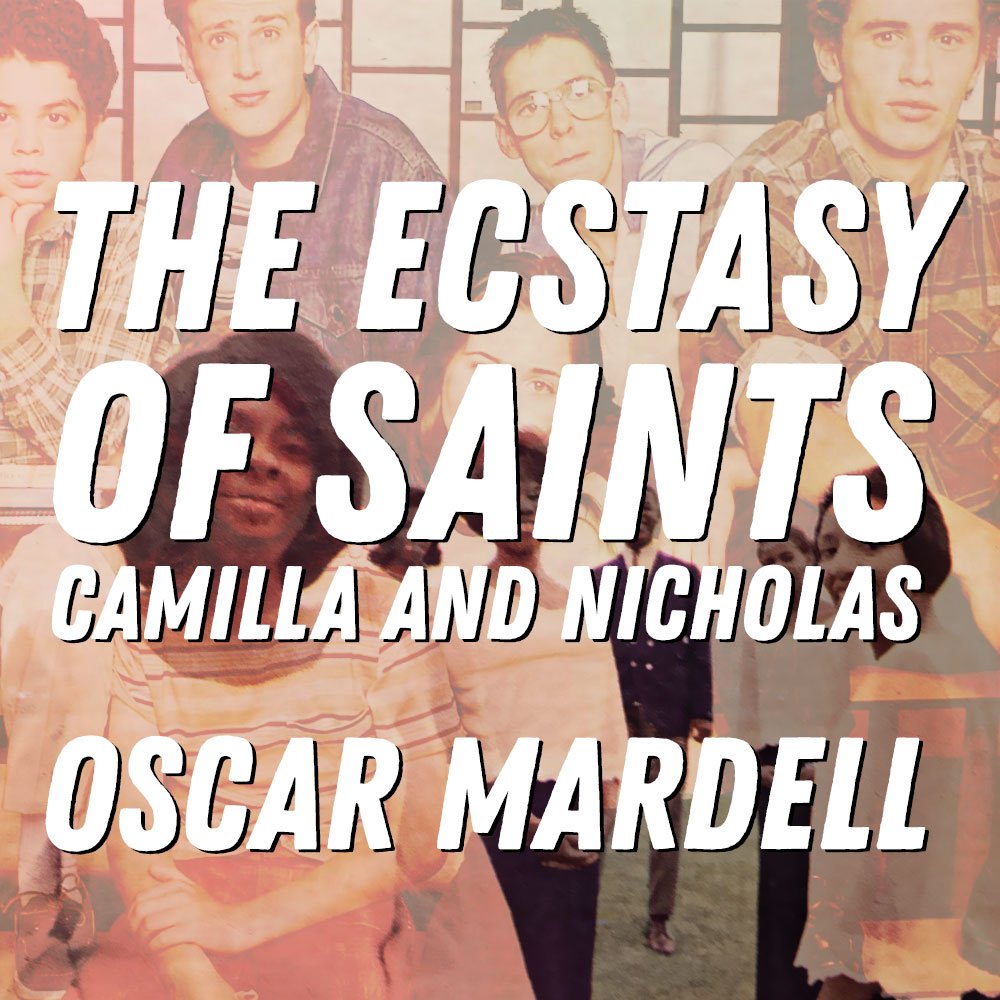The Ecstasy of Saints Camilla and Nicholas: “Jesus Is Just Alright” by oscar mardell
Christianity is a religion for losers.
—Ted Turner, address to the American Humanist Association (1990)
How very true! What an accurate definition indeed!
—Simon Leys, “The Imitation of Our Lord Don Quixote” (1998)
I still love Freaks and Geeks. Set in 1980-1981, but shot and aired in 1999-2000, the series depicts the coming-of-age of Detroit highschooler Lindsay Weir (Linda Cardellini)—a former Geek attempting, with varying degrees of success, to ingratiate herself with the Freak clique. Most of all, I love the times when the distinction between those categories proves to be nominal—when the Geeks, in other words, turn out to be the real Freaks: when Sam Weir (John Francis Daley) is left with no choice but to streak through the school, when Bill Haverchuck (Martin Starr) ends up cross-dressing for Halloween, or when Neal Schweiber (Sam Levine) finds himself filling in for the school mascot and wreaking havoc on the cheerleading squad. What use are terms like ‘Freaks’ and ‘Geeks’ in times like these? What did they even mean to begin with?
“Freaks,” as Gary S. Cross describes in Freak Show Legacies, has a complex etymology:
The word conventionally meant “physiologically deviant human beings” who were involuntarily rejected by society; but in the context of the late 1960s it meant also a “choice,” a mark of estrangement, but also an “honorific title … by the physiologically normal but dissident young people who use hallucinogenic drugs and otherwise are known as ‘hippies.’”…Thus, rocker Frank Zappa in his “Freak-Out” album of 1965-66 … claims, “Freaking Out is a process whereby an individual casts off outmoded and restricting standards of thinking, dress, and social etiquette in order to express CREATIVELY his relationship to his immediate environment and the social structure as a whole.”
The Freaks of Freaks and Geeks are certainly no Hippies (they even find Kerouac”s On the Road “boring”). Their guidance counsellor, Mr. Rosso (Dave “Gruber” Allen) certainly is, but he’s also a total embarrassment: evidently, the “thinking, dress, and social etiquette” which had made Rosso a “dissident” in the late 60s has itself become, by the dawn of the 80s, “outmoded and restricting”. The Freaks of “Freaks and Geeks”, then, are probably best understood as Freaks après la lettre. Like the Hippie-Freaks before them, they continue to estrange themselves from normality—only, in their eyes, normality now includes those very Hippie-Freaks.
“Geeks”, too, has an interesting history. As Nick Tosches explains in his introduction to the 2010 reissue of William Lindsay Greshams’s Nightmare Alley:
The word “geek” (derived from “geck,” a word for a fool, simpleton, or dupe, in use since from at least the early sixteenth century) was generally unknown in its carnival sense of a “wild man” who bites the heads off snakes and chickens until Gresham introduced it to the general public in Nightmare Alley.
In that novel’s opening chapter (“The Fool”), freak-show barker Clem Hoatley explains how such a “wild man” is made:
You pick up a guy and he ain’t a geek—he’s a drunk. A bottle-a-day booze fool. So you tell him like this: “I got a little job for you. It’s a temporary job. We got to get a new geek. So until we do you’ll put on the geek outfit and fake it.
Well, he does this for a week and you see to it that he gets his bottle regular and a place to sleep it off in. He likes this fine. This is what he thinks is heaven. So after a week you say to him like this, you say, “Well I got to get me a real geek. You’re through” … He comes following you, begging for another chance and you say, “Okay. But after tonight out you go.” But you give him his bottle.
That night you drag out the lecture and lay it on thick. All the while you’re talking he’s thinking about sobering up and getting the crawling shakes. You give him time to think it over, while you’re talking. Then throw in the chicken. He’ll geek.
The Geeks of Freaks and Geeks are certainly no fools; and while they don’t exactly bite the heads off chickens either, they have, like Gresham’s geek, been driven to the lowest and most spectacular rung of the social ladder by an all-consuming addiction—albeit, to science kits and science fiction, rather than to booze per se. The main difference between the eponymous cliques of Freaks and Geeks, then, is not that the Freaks are hip (or even alt-hip) while the Geeks are square, it’s that the Freaks have achieved estrangement while the Geeks have had it thrust upon ‘em. When Sam streaks, Bill goes cross-dressing, or Neal pisses off the cheerleaders, they only spell out what the etymology had writ large all along: a Geek is a type of Freak—perhaps, even, the freakiest type. Failure, here, is success. It’s hip to be square.
The time in the series when this is clearest—when the distinction between Freak and Geek is murkiest—occurs about halfway into Episode 2, “Beers and Weirs”. Mr and Mrs Weir (Joe Flaherty and Becky Anne Baker) have gone out of town for the weekend. In their absence, Lindsay is hosting a party for which she and the Freaks have procured a keg. In walks Lindsay’s former best friend, Millie Kentner (Sarah Hagan): a devout Christian and champion Mathlete—which is to say, a Geek par excellence (albeit, addicted to prayer and algebra). Millie has turned up in order to demonstrate that she can have more fun without drinking—that she can get higher “on life” than any of them can get on beer. What neither Millie nor the Freaks know, however, is that Geeks Sam, Bill, and Neal—worried for the depraved antics that might ensue if the other guests are drunk—have substituted the Freaks’ keg for one containing non-alcoholic beer. Everyone at this party, then, is high, like Millie, “on life”—or, at least, on the placebo effect (everyone, that is, except for ultra-Geek Bill Haverchuck, who sits alone in Sam’s room, sipping from the alcoholic keg).
Millie sits down at the Weirs’ piano and begins to play “Jesus Is Just Alright”. At first, the Freaks simply laugh at her. Then a miracle occurs: Nick Andopolis (Jason Segel), the super-Freak, joins in. What’s going on here? How’s this even possible?
*
“Jesus Is Just Alright” was originally written and recorded by The Art Reynolds Singers in 1966. To my ear, the track is an absolute banger. The drumming is tight, straightforward, and obsessively repetitive; the piano, meanwhile, is ever so slightly out of tune. The regularity of the rhythm, then, seems to be holding the discordance of the melody together. The feeling is akin to that of marching home tipsy, perhaps in the dark: both in control and out of it; confidently approaching safety, but happily inebriated along the way.
The singing begins with much the same feeling: both in control and out of it. Every voice is synchronised and in perfect harmony, but the higher parts are practically screaming, as if in orgasm. In Ray (2004), Ray Charles (Jamie Foxx) is accused of perverting Gospel, of “turning God’s music into sex.” Here, however, it’s clear, not that “God’s music” was “sex” all along, but that divine transcendence and erotic rapture were simply different flavours of ecstasy; that Gospel is, in other words, the rightful heir to a tradition comprised of the poems of Hildegard von Bingen, the writings of Teresa of Ávilat, and the sculptures of Gian Lorenzo Bernini.
The title lyric deserves some attention. In the Hippie slang of the 1960s, “just alright” means “really great”. On the one hand, there’s an absurd tension, then, between the lyric’s sentiment and the language in which it is expressed—between the sacred and the vulgar, the ancient and the trendy. It’s as if The Art Reynolds Singers have simply failed to articulate, perhaps even to grasp, the gravity of Christian faith. On the other hand, this is, I think, precisely the point. For G.K. Chesterton (who, before his conversion to Catholicism, routinely described himself as an “Orthodox Christian”), “If a thing is worth doing, it is worth doing badly”. Christian faith, the song seems to suggest, is no exception: too important to be practised by anyone other than total amateurs; “a religion for losers”. For The Art Reynolds Singers, true love for Christ can only be known by those who are giddy with that love, glimpsed by those who are blinded by it, and expressed by those who are unable to give it proper expression. Here as well, failure is success. The last will be first.
When Milly sits down at the Weirs’ piano, she has in mind, I think, the Art Reynolds Singers’ version of ‘Jesus is Just Alright’. If she’s turned up in order to demonstrate that she can get higher “on life” than the Freaks can get on beer, then she’s made an excellent choice: few songs convey so perfectly the sheer intoxication of uninhibited piety, the masochistic thrill of absolute devotion; few songs summarise so succinctly the creed of the Geek par excellence—the Jesus Freak.
When the actual Freaks laugh at Millie, it isn’t because they recognise themselves in her, nor because they’re sensitive to the absurd tension between Christian faith and Hippie-slang (both, to those Freaks, are simply “outmoded and restricting”). It’s because they think that Milly’s piety is out of place at a keg party. Figurative intoxication, they figure, just doesn’t belong at an occasion reserved for literal intoxication. Of course, the last laugh is on those very Freaks, who’re blissfully unaware that their own intoxication isn’t literal either. They aren’t drunk on alcohol, but on the general atmosphere. They aren’t a mob of loutish Freaks on the beers, just a convention of excitable Geeks with pop. Meanwhile, Bill Haverchuck, the most excitable Geek of all, is nonchalantly skolling real beer next door.
*
In 1969, a cover of “Jesus Is Just Alright” was released by The Byrds (whose drummer, Gene Parsons, had been present in the studio when The Art Reynolds Singers were recording the original). To my ear, the track is a grotesque parody. The drumming is too complicated, the instruments are too many and too well-tempered, the moods are too varied, the wall of vocal harmonies has been reduced to two parts, and the ecstatic screaming has been swapped for some indifferent crooning. It’s tempting, then, to be cynical here—to dismiss the Byrds’ version as, say, another whitewashing of Black tradition (particularly tempting, when the Byrds’ version appropriates so heavily from The Blues as well). However, such criticism—though it is often legitimate—would, in this case, be reductive. Here too, failure is success.
When Bill Haverchuck dresses up for Halloween as Jaime Sommers from “The Bionic Woman”, he isn’t just trying to imitate Our Lady Lindsay Wagner. He’s trying, and—crucially—failing, and thereby proving that no one, least of all him, can imitate her. Even better, he’s failing in a way which is catastrophically at odds with the character’s intended meaning—that is, with Sommers’ role as a sex symbol. Bill has successfully reproduced her particular features—her long blond hair, her red lipstick, her buoyant breasts—but he’s utterly failed to convey the femininity for which she is revered. This, I think, is what he’s getting at when he declares, “I’m not a little girl, I’m a Bionic Woman!”: Cyborgs, it seems, are “just alright” with Bill, but the opposite sex is gross. The unlikely power of Sci-Fi fandom, like the sanctity of the Christian faith, derives from the impotence and shortcomings of its practitioners—from its being, in other words, “a religion for losers”.
The same could be said of The Byrds. They aren’t just trying to imitate The Art Reynolds Singers. They’re trying, and—crucially—failing, and thereby proving that no one, least of all them, can imitate them. Even better, they’re failing in a way which is catastrophically at odds with the original song’s intended meaning. The Byrds have successfully reproduced its particular features—its melody and its lyrics—but they’ve utterly failed to convey its sanctity, substituting it for the profane and hellish noise of overdriven guitars. Gospel music, it seems, is “Just Alright” with The Byrds, but Jesus, manifestly, is not. The cryptic blasphemy of Rock ‘n’ Roll, like the sanctity of the Christian faith, derives, again, from the impotence and shortcomings of its practitioners—from its also being “a religion for losers”.
*
Given that Nick possesses an encyclopaedic knowledge of Rock ‘n’ Roll obscura—given that he is, in other words, a Rock ‘n’ Roll Geek—there’s a chance that, when he joins in with Millie, he’s singing The Byrds’ version of “Jesus Is Just Alright”. Given, however, that the other partygoers could hardly be expected to be familiar with that version, there’s a higher chance, I think, that he’s singing the more famous version released by The Doobie Brothers in 1972. To my ear, the track isn’t a cover per se, but a cover of a cover: it doesn’t imitate (or fail to imitate) The Art Reynolds Singers but The Byrds—for which reason, it bears a new meaning again. What is that meaning?
Firstly, we can’t rule out the possibility that the Doobie Brothers’ version is, like The Art Reynolds Singers’, simply earnest. This is certainly how the track was received both by the Hippies in The Jesus Movement of the late 60s, among whom the track was enormously popular, and by the Christian Hip-Hop/Rock Band DC Talk, who released their own cover in 1992. If Millie isn’t playing the original version, then she’s playing the Doobie Brothers’ with the intention of it being received this way—that is, as a sincere statement of Christian piety.
Nor, however, can we rule out the possibility that The Doobie Brothers’ version is simply ironic. None of them were ever religious, and their rendition, like The Byrds’ before it, utterly fails to convey the sanctity of the original—substituting it for the more profane and more hellish noise of more overdriven guitars. Rock ‘n’ Roll, it seems, is “Just Alright” with The Doobie Brothers, but Jesus, once more, is not. If Nick isn’t singing the Byrds’ version, then he’s singing the Doobie Brothers’ with the intention of it being received in this way—that is, as a parody of Christian piety. For Nick, Rock ‘n’ Roll is the one true faith, besides which all others pale. As he puts it himself it in the series’ opening scene: “I believe in God, man. I’ve seen him. I’ve felt his power! He plays drums for Led Zeppelin and his name is John Bonham, baby!”
Nor, however, do we actually have to pick one of these possibilities over the other. When asked, in 2009, about the song’s popularity within The Jesus Movement, Tom Johnston of The Doobie Brothers told Songfacts, “The funny thing about that, we weren’t anti-religious”. The double-negative deserves some attention: “weren’t anti-religious” is obviously not the same as “weren’t religious”, but it isn’t quite the same as “were religious” either. The suggestion here is that while the song isn’t just earnest, nor is it just ironic—that it’s more complex still: perhaps “post-ironic”—which is to say, both earnest and ironic, or somewhere between the two. Millie and Nick contribute the different parts, but only when they sing together is the song’s full meaning revealed.
What is that meaning? What lies, in other words, between “just alright” as in “really great,” and “not alright” as in “outmoded and restricting”? The answer, I think, lies on the surface: “just alright” as in, literally, “just alright”—as in “fine” or “average”. This, however, is a meaning which altogether defies meaning. Who rhapsodises the mediocre? To whom is Jesus mediocre? What failed anti-Christians think Him “fine”? What failed anti-Christians, for that matter, are so full of faith—that is, are so Christian—as to believe that the Son of God exists in the first place? Conversely, what failed Christians think their saviour “average”? What failed Christians, for that matter, are so devoid of meekness and humility—that is, are so un-Christian—as to pass judgement on Him in the first place? The mysteries, here, are simply impenetrable.
*
My favourite joke in all of Shakespeare occurs in Act 4 Scene 1 of As You Like It. Rosalind, purporting to be Ganymede, says to Orlando:
Come, woo me,
woo me, for now I am in a holiday humour, and like
enough to consent. What would you say to me now
an I were your very, very Rosalind?
The joke is clearer when we recall that on the Elizabethan stage, female roles were played by male actors. With this in mind, we know that something outrageously complicated is taking place: a man playing a woman (Rosalind) disguised as a man (Ganymede) is inviting another man (Orlando) to treat him like a woman (Rosalind). What we see, however, is perfectly straightforward—basic, even: a man, dressed as a man, seducing a man. The humour derives from the tension between the fiendish complexity of the set up and the pure simplicity of the punch line.
The same tension is present when Nick joins Millie at the Weir piano. We know that something outrageously complicated is taking place: a Geek who is so fanatic that she resembles a Freak, and who believes that she is sober though she is figuratively drunk on virtue, performs an earnest expression of her faith; a Freak who is so fanatic that he resembles a Geek, and who believes that he is drunk though he is literally sober, joins in with a mockery of her faith via which he performs an earnest expression of his own. What we see, however, is perfectly straightforward: a pair of losers singing in exultation.
Oscar Mardell lives in Auckland, New Zealand, where he teaches Classical Studies and History of Art. He is the author of two poetry collections: Housing Haunted Housing and Great Works.


